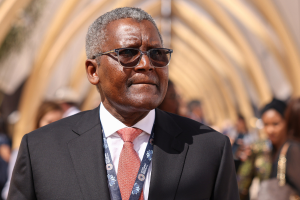Dangote Petroleum Refinery and Petrochemicals has initiated legal proceedings against the Nigeria Midstream and Downstream Petroleum Regulatory Authority (NMDPRA) and several major importers in the oil and gas sector. The lawsuit, filed at the Federal High Court in Abuja, seeks N100 billion in damages.
The refinery argues that NMDPRA has continued to issue licenses for the importation of refined products such as Automotive Gas Oil (AGO) and Jet-A1 (aviation fuel), despite the refinery’s production exceeding domestic consumption levels. Dangote claims that these imports are unnecessary and are hindering the refinery’s operations.
Oil marketers have countered this claim, stating that the market has been deregulated, allowing them to import products or purchase them from the $20 billion Lekki-based refinery.
In addition to seeking damages, Dangote has requested the cancellation of import licenses granted to the Nigerian National Petroleum Corporation Limited (NNPCL), Matrix Petroleum Services Limited, A. A. Rano Limited, and four other firms. The refinery alleges that these imports have flooded the market with refined products it already produces, undermining its operations.
The NMDPRA, NNPCL, Aym Shafa Limited, A. A. Rano Limited, T. Time Petroleum Limited, 2015 Petroleum Limited, and Matrix Petroleum Services Limited have been named as defendants in the case.
Dangote contends that NMDPRA has violated sections of the Petroleum Industry Act by issuing import licenses without sufficient evidence of product shortfalls. The refinery accuses the regulator of neglecting its statutory role to promote local refineries.
According to an affidavit by Ahmed Hashem, Dangote refinery’s General Manager of Government and Strategic Relations, the importation of AGO and Jet-A1 has disrupted the refinery’s business operations, leading to unsold products. The affidavit states that the refinery’s “business activities and investments are being jeopardised and may get worse by the day unless the Honourable Court intervenes.”
Furthermore, Dangote alleges that NMDPRA has threatened to impose a 0.5 per cent levy on wholesale buyers and off-takers, as well as another 0.5 per cent levy for the Midstream and Downstream Gas Infrastructure Fund. The refinery argues that these levies contradict the purpose of free zones, which are intended to foster competition and attract foreign investments.
The lawsuit also accuses international oil companies and the defendants of conspiring to undermine Nigeria’s indigenous refining efforts. It notes that “these companies and entities are doing everything to sabotage the operation of the plaintiff and have been sponsoring the media to come up with all sorts of stories and untrue statements.”
In addition to damages and the cancellation of import licenses, Dangote refinery is seeking a court declaration confirming its exemption from all federal, state, and local taxes. The refinery argues that it is entitled to these exemptions under the Nigerian Export Processing Zone Act, the Companies Income Tax Act, and other relevant laws.
The refinery has requested the court to stop NMDPRA from issuing further import licenses to the named companies, seal off their tank farms, storage facilities, and stations, and withdraw all existing import licenses granted to them.
At a recent hearing, counsel for Dangote informed the court that the parties were exploring a possible settlement. The judge has adjourned the case to allow for further discussions.
NMDPRA has stated that it is not aware of the lawsuit and has not received any summons. The NNPCL has not issued a public statement on the matter.
Petroleum marketers have expressed differing views on the case. Some argue that the Petroleum Industry Act permits NMDPRA to issue fuel import licenses to qualified companies, while others believe that the market should be open to all importers.
Dangote refinery has refuted claims that it filed a lawsuit against NNPCL, NMDPRA, and other marketers to revoke their licenses to stop fuel importation. The refinery stated that the case is not new and originated from an issue that began in June. It also noted that events, including the naira for crude sales, have overtaken this development and that it plans to withdraw the lawsuit.
Petroleum marketers have expressed surprise over the case, saying no law bans the importation of petroleum products, whether or not there were enough products refined locally. Some of the marketers requested to see the originating summons before making comments on the matter.





Add Comment